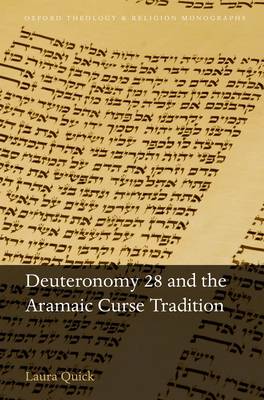
Door een staking bij bpost kan je online bestelling op dit moment iets langer onderweg zijn dan voorzien. Dringend iets nodig? Onze winkels ontvangen jou met open armen!
- Afhalen na 1 uur in een winkel met voorraad
- Gratis thuislevering in België vanaf € 30
- Ruim aanbod met 7 miljoen producten
Door een staking bij bpost kan je online bestelling op dit moment iets langer onderweg zijn dan voorzien. Dringend iets nodig? Onze winkels ontvangen jou met open armen!
- Afhalen na 1 uur in een winkel met voorraad
- Gratis thuislevering in België vanaf € 30
- Ruim aanbod met 7 miljoen producten
Zoeken
Omschrijving
This study considers the relationship of Deuteronomy 28 to the curse traditions of the ancient Near East. It focuses on the linguistic and cultural means of the transmission of these traditions to the book of Deuteronomy. Laura Quick examines a broad range of materials, including Old Aramaic inscriptions, attempting to show the value of these Northwest Semitic texts as primary sources to reorient our view of an ancient world usually seen through a biblical or Mesopotamian lens. By studying these inscriptions alongside the biblical text, Deuteronomy 28 and the Aramaic Curse Tradition increases our knowledge of the early history and function of the curses in Deuteronomy 28. This has implications for our understanding of the date of the composition of the book of Deuteronomy, and the reasons behind its production. The ritual realm which stands behind the use of curses and the formation of covenants in the biblical world is also explored, arguing that the interplay between orality
and literacy is essential to understanding the function and form of the curses in Deuteronomy. This book contributes to our understanding of the book of Deuteronomy and its place within the literary history of ancient Israel and Judah, with implications for the composition of the Pentateuch or Torah as a whole.
and literacy is essential to understanding the function and form of the curses in Deuteronomy. This book contributes to our understanding of the book of Deuteronomy and its place within the literary history of ancient Israel and Judah, with implications for the composition of the Pentateuch or Torah as a whole.
Specificaties
Betrokkenen
- Auteur(s):
- Uitgeverij:
Inhoud
- Aantal bladzijden:
- 240
- Taal:
- Engels
- Reeks:
Eigenschappen
- Productcode (EAN):
- 9780198810933
- Verschijningsdatum:
- 15/12/2017
- Uitvoering:
- Hardcover
- Formaat:
- Genaaid
- Afmetingen:
- 218 mm x 145 mm
- Gewicht:
- 362 g

Alleen bij Standaard Boekhandel
+ 299 punten op je klantenkaart van Standaard Boekhandel
Beoordelingen
We publiceren alleen reviews die voldoen aan de voorwaarden voor reviews. Bekijk onze voorwaarden voor reviews.











